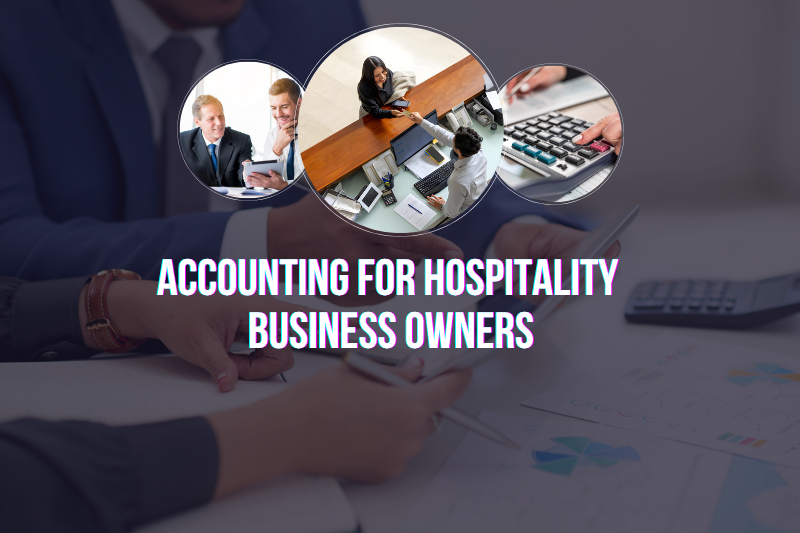Articles >
Essential Accounting and Tax Advice for Hospitality Businesses

November 03, 2025
Running a hospitality business in the UK, whether a hotel, restaurant, café or catering service, means juggling customer experience, staff and the practical realities of tax compliance. The hospitality sector often runs on narrow margins and missed tax deadlines or overlooked obligations quickly create penalties and cash flow strain. To stay compliant and maintain a healthy business, it is important to follow some simple and essential tax tips which every hospitality business owner should know.
1. Understand Your Tax Obligations
The first step is to identify the types of taxes applicable to your business. Most hospitality businesses need to consider:
- Corporation Tax: Payable on your business profits once you register a UK limited company with HMRC.
- VAT (Value Added Tax): Charged on sales if your turnover exceeds the VAT threshold (currently £90,000). Hospitality businesses often deal with mixed VAT rates depending on the services and food items sold.
- PAYE and National Insurance: Relevant if you employ staff.
- Business Rates: Charged on the property your business occupies.
Being aware of these obligations and keeping track of deadlines is key to avoiding HMRC penalties.
2. Maintain Accurate and Organised Records
Good bookkeeping is at the heart of tax efficiency. Ensure that you record every sale, purchase, payroll expense, and supplier payment. Many hospitality businesses handle high-volume, low-value transactions, making manual record-keeping prone to errors. Using cloud accounting software such as Xero or QuickBooks can streamline your bookkeeping, automate VAT filings, and ensure compliance with Making Tax Digital (MTD) requirements.
3. Claim All Eligible Business Expenses
The hospitality industry has several deductible expenses that can significantly reduce your tax liability. These include:
- Food and drink supplies purchased for resale.
- Staff wages, uniforms, and training costs.
- Utility bills, rent, and maintenance expenses.
- Marketing, advertising, and professional fees.
- Equipment and furniture depreciation.
Keep digital or paper copies of receipts and invoices because HMRC can request evidence during routine checks and audits. Properly claiming these deductions ensures you don’t pay more tax than necessary.
4. Manage VAT Correctly
VAT can be particularly complex in the hospitality sector because different items and services attract varying VAT rates. For example, cold takeaway food is usually zero-rated, while hot takeaway food attracts standard VAT. Accommodation, catering, and restaurant services are generally charged at the standard rate.
Review pricing and invoices regularly to confirm the correct VAT rate is applied to each item or service. Consider seeking professional advice if your business sells a mix of taxable and exempt items.
5. Plan for Seasonal Cash Flow
Hospitality businesses often face seasonal fluctuations in income. During off-peak months, cash flow can tighten, making it challenging to meet tax deadlines. Plan ahead by setting aside funds throughout the year for VAT, PAYE, and Corporation Tax payments. Maintaining a tax reserve account ensures you’re never caught off guard.
6. Seek Professional Accounting Support
Given the complexities of hospitality tax regulations, working with a qualified accountant can save you time, stress, and money. An experienced hospitality accountant can help you manage payroll, file accurate VAT returns, identify tax-saving opportunities, and ensure compliance with HMRC.
FAQs on Tax Tips for Hospitality Business Owners
1. Why is it important for hospitality business owners to stay updated with tax rules?
Staying updated with tax rules helps hospitality business owners stay compliant and avoid penalties. Tax laws change often, so keeping up ensures they can benefit from available reliefs and manage finances more effectively.
2. What is one common challenge faced by hospitality businesses?
Hospitality businesses work with tight profit margins and high costs like rent, wages, and supplies. Even small financial mistakes can hurt profits, so efficient tax planning is key to controlling costs and staying financially stable.
3. Which of the following can lead to financial stress for a hospitality business?
Missing tax deadlines can cause fines and strain cash flow, making it harder to cover expenses. Timely filing helps maintain financial health and reduces stress.
4. What should hospitality business owners do to manage their taxes efficiently?
Hospitality business owners should keep accurate records of sales, purchases, payroll, and expenses. Using accounting software or an accountant makes tax filing easier and helps identify deductions and savings.
5. Why is tax compliance especially important in the hospitality sector?
Tax compliance prevents fines and supports business growth. It builds credibility, allows focus on service and expansion, and ensures long-term success.
Tax management in the hospitality industry requires careful planning, accurate bookkeeping, and ongoing compliance. By keeping organised records, claiming allowable expenses, applying the right VAT rates, and working with a trusted accountant, you can minimise tax liabilities and focus on growing your business. Effective tax planning is not only about compliance but also about improving profitability and supporting long term business growth.
Need help with hospitality accounting and tax? Our team of accountants in London offers tailored accounting and tax solutions to restaurants, hotels, and catering services.

